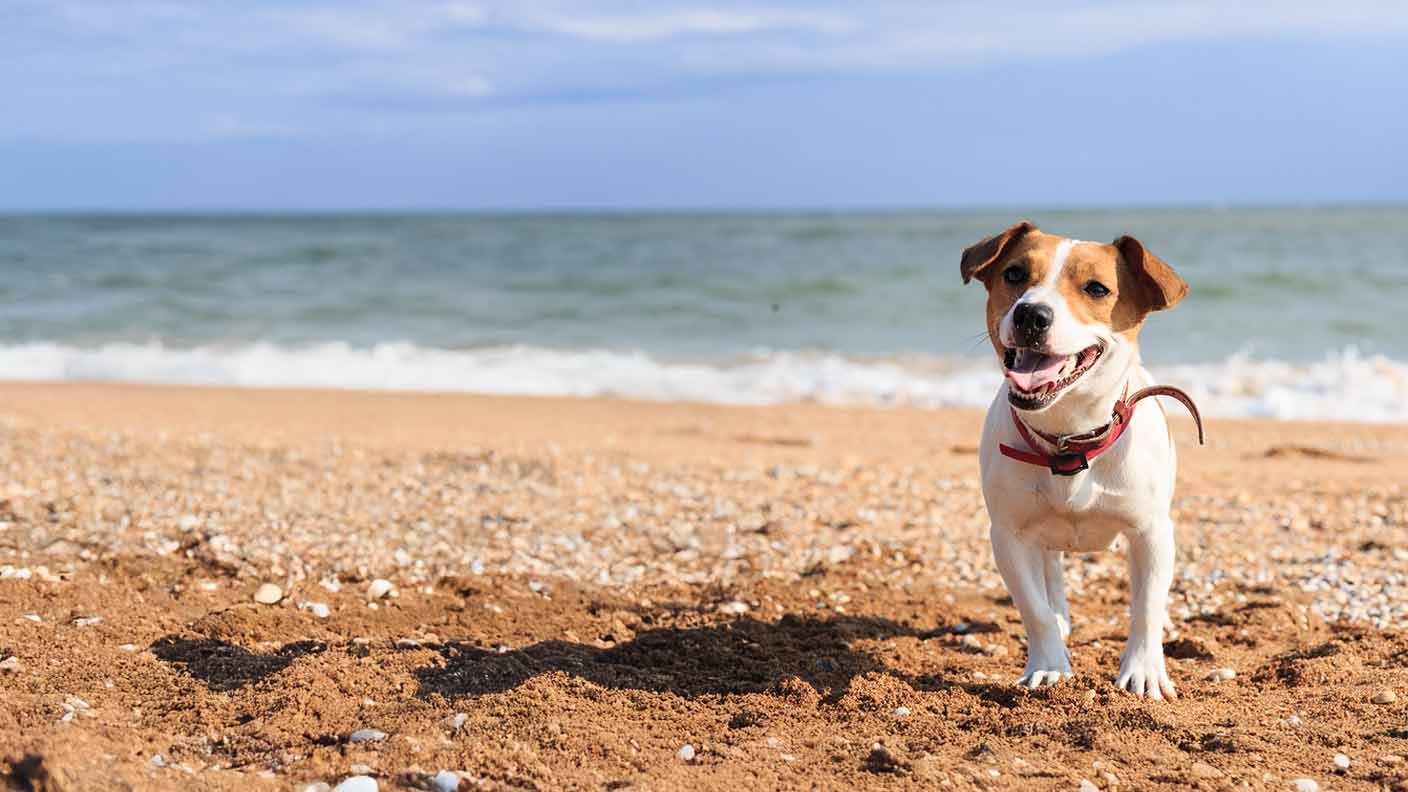Jack Russell dog breed information and advice
If you’re thinking of getting a new dog, the Jack Russell Terrier could be the breed for you. They’re intelligent, fearless and love to play. Their lively personality and kind temperament make them a perfect pet, but it’s always recommended to understand the breed’s needs before you bring your new companion home.
This handy guide covers everything you might need to know, including Jack Russell temperament, care tips, feeding, training, insurance and much more.
Jack Russell facts

| Lifespan | 13 - 16 years |
| How much | £500 - £1,200 |
| Size | 26 - 33 cm |
| Weight | 7 - 12 kg |
| Colours | white with either black, brown or tan markings |
| Grooming | once a week |
| Temperament | lively, active, vocal, intelligent and fearless |
| Exercise | regular, daily exercise |
Jack Russell insurance
Health problems can happen at any age, so it’s best to start with puppy insurance. Having Jack Russell insurance helps to cover the cost of treatment, consultations, medication, nursing care or even surgery.
Common health problems that can affect Jack Russells include:
However, Jack Russells may have fewer health problems, making them cheaper to insure.
Sainsbury’s Bank Pet Insurance
Sainsbury’s Bank can provide new dog insurance cover for your Jack Russell from eight weeks old.
There are three types of cover you can get with Sainsbury’s Bank Pet Insurance:
- Lifetime – our most comprehensive cover with access to up to £10,000 towards vet costs each year.
- Maximum benefit – cover for illnesses, accidents and conditions of up to £6,000.
- Time limited – can cover your dog with vet costs for short-term health conditions of up to £3,000, or for 12 months.
Please note that we won't cover any pre-existing conditions and that terms, conditions, excesses, exclusions and limitations apply.
How to care for a Jack Russell
Food, nutrition, grooming and exercise are all important parts of caring for any dog. Giving your Jack Russell lots of love, care and attention will help them live a happy and healthy life.
Feeding and nutrition
Starting your puppy on the right diet is important. Where possible, you should use the same food as the dog breeder to prevent an upset tummy. If you want to change the dog food, you need to change it slowly by adding small amounts of the new food to the original food.
As your Jack Russell grows, make sure you change from puppy food to adult dog food. Tailoring their diet helps to make sure your dog is getting the correct nutrients for their age. It’s easy for them to become overweight so you’ll need to know how much to feed a Jack Russell. Puppies should be fed three or four times a day, but as they get older, you should only feed them once or twice a day.
Jack Russells prefer to eat small biscuits. Make sure the dry dog food is suited to the size of your dog. Food packaging will provide guidance on suitability and portion size to help you serve the right amount.
Grooming
There are three types of Jack Russell coats – smooth, broken and rough. So, whether you have a wire haired or long haired Jack Russell, their coats are low maintenance. To minimise the amount of fur on the floor and furniture, you should brush your dog once a week; removing any loose fur and keeping their coat clean and smooth.
Exercise
A true hunting dog, Jack Russells love exploring and have lots of energy, so they should be exercised daily. Puppy legs can get tired easily; however, you should aim to walk an adult Jack Russell twice a day, for at least one hour.
Their exercise doesn’t have to be limited to walks – playtime can count too! Keeping your dog exercised for an hour a day keeps their mind and body active. It will also prevent any destructive behaviour that might creep in if they become bored.
Training
Jack Russells learn quickly and are eager to please, and training them will help prevent bad behaviour. Training classes are a great way to pick up tips and give your Jack Russell a chance to socialise. For better results, include toys and treats as part of their training; making it fun and delicious for your dog.
Puppy toilet training tends to be easy with this breed and can be included with their dog training too.
Temperament and behaviour
Jack Russells are known for being devoted and eager to please, making them a perfect family companion.
Although they’re small, they have long legs, so they’re fast runners. They’re also very flexible and can get in small places. Your garden will need to be secure to stop your Jack Russell from escaping. One thing is for certain, they will dig, so don’t leave them on their own in your garden for long.
Jack Russells don’t like to be left alone for long periods. If you have to go out, make sure they always have toys to play with. This will help keep them entertained and out of mischief.
Common health problems
Like all breeds, Jack Russells can suffer from several health issues, although they’re generally a very healthy breed of dog.
You should take your Jack Russell to the vet regularly and the right dog insurance will help cover the costs if you need it. There are some common health issues found in Jack Russells that vets will need to keep an eye on.
Atopy
Atopy is a genetic tendency to develop skin allergies and affects one in 10 dogs.
There are lots of allergens that can affect sufferers. Dust mites, pollen and mould are the most common. Less commonly, they can be allergic to protein in food.
If your Jack Russell has atopy, they’ll experience regular ear and skin infections. They may also have itchy eyes or a runny nose. You should visit your vet if your dog is scratching, biting and licking themselves.
Anti-inflammatory medications are given to reduce inflammation. You might also need to avoid allergens in their diet and give them food that has high levels of fatty acids. Desensitisation vaccines are given over a few months to treat the condition, followed by life-long yearly injections.
Regular grooming will help with natural skin cell shedding. Medicated washes and ear cleaners are also available. Other drug therapies may be needed in more severe cases, but your vet will be able to advise you of the best treatment for your Jack Russell.
Impacted anal glands
Impacted anal glands is when there is a build-up of fluid in the anal sac, which becomes inflamed and infected. The cause is unknown but is often related to diet. You should visit your vet if your dog is licking and biting the area, has redness, swelling, or is dragging their bottom on the ground.
The anal sac needs to be emptied to treat the problem. If there is an infection, antibiotic ointment may be needed and in severe cases, surgery may be required.
Luxating patella
Luxating patella is where the kneecap is unstable and doesn’t slide into the correct place. Dogs suffering from this condition will hop rather than use the affected leg.
Some animals don’t require any treatment as it can be temporary. In most cases, surgery is required to correct the position of the kneecap. Your vet will be able to advise you on the best treatment for your Jack Russell.
Polydipsia
Polydipsia is excessive drinking or thirst. This can be caused by prolonged exercise, a salty diet, or drug-related side effects. Your vet will need to carry out some tests to work out the cause but, often diet and lifestyle changes can be made to resolve the problem.
So, is a Jack Russell right for you?
Jack Russells are loyal companions with an adventurous, curious nature – the perfect match for equally adventurous owners.
They’re loyal, energetic and love to play – making them great playmates for kids young and old. Jack Russells tend to get bored, so if they have a loving family that can give them attention – even better.
With such low maintenance fur, they also don’t take much grooming, making it easier to care for them. Best of all, thanks to the Jack Russell lifespan, they’re likely to be around to spread love and adoration with the family for years to come.
Frequently asked questions
How long do Jack Russells live?
The Jack Russell has a lifespan of 13 to 16 years. They’re a generally healthy breed with little health issues. However, covering your dog with Sainsbury’s Bank Pet Insurance can help to keep them protected if the worst happens.
Are Jack Russells easy to train?
Yes, Jack Russells are intelligent dogs and were bred for hunting. This means that they can follow commands and work well with other dogs.
Where are Jack Russells from?
The Jack Russell Terrier is an early British fox hunter. Their long legs and flexible bodies make them excellent hunters. They’re also small enough to get into dens and lure the prey out.
Do Jack Russells bark a lot?
Yes, Jack Russells bark a lot and can be very vocal. They are bred to hunt and will bark to let their owner know that they have found prey. Their bark is part of their character and is completely normal behaviour.

Browse our guides
Choose from our list of helpful guides and information

Explore dog breeds
Find out how to keep your dog healthy and happy

Cat breed guides
How to care for your cat, common health problems and more
Terms and conditions
Important information
* The discount is based on information related to you and the Sainsbury’s and Sainsbury’s Bank transactions linked to your Nectar account. For more information on how we use your data, go to sainsburysbank.co.uk/privacy
Sainsbury's Bank plc, Registered Office, 33 Charterhouse Street, London, EC1M 6HA (registered in England and Wales, no 3279730) is authorised by the Prudential Regulation Authority and regulated by the Financial Conduct Authority and the Prudential Regulation Authority (register no. 184514).
Sainsbury's Supermarkets Ltd is an appointed representative of Sainsbury's Bank plc. Sainsbury's Bank plc acts as an introducer to Pinnacle Insurance Ltd who is authorised by the Prudential Regulation Authority and regulated by the Financial Conduct Authority and the Prudential Regulation Authority (register number 110866). Registered office: 4th Floor, Limelight, Elstree Way, Borehamwood, Hertfordshire, WD6 1JH. Sainsbury’s Bank Pet Insurance is arranged, administered and underwritten by Pinnacle Insurance Ltd. Sainsbury's Bank plc and Pinnacle Insurance Ltd are not part of the same corporate group.
We do not provide personal recommendations to customers.
